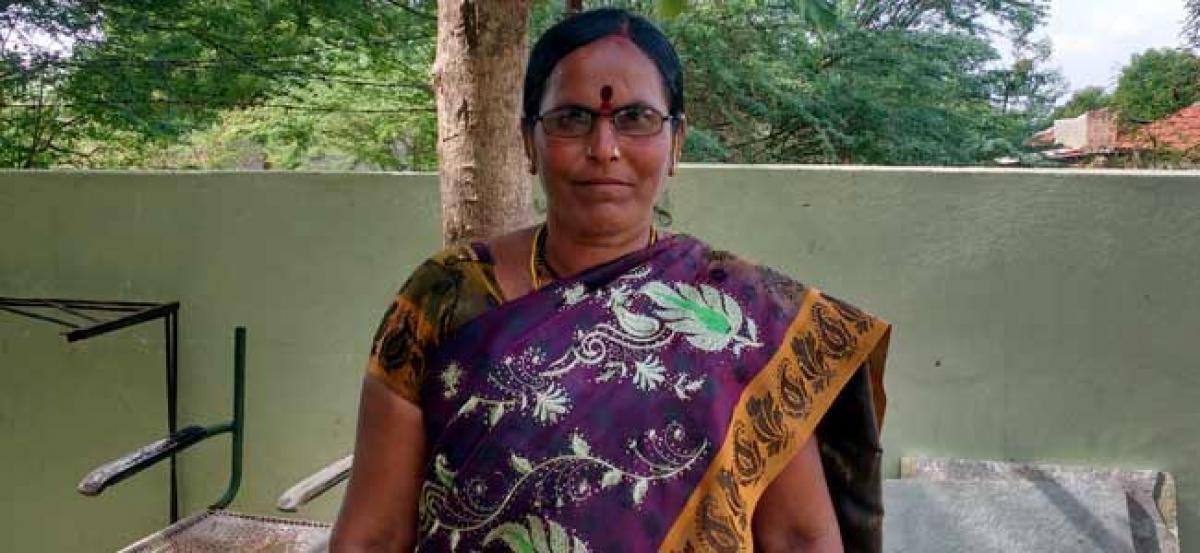Live
- Accused Sentenced to Life Imprisonment with Rigorous Punishment and Fined Rs. 25,000 for Murder
- ANR Centenary Celebrations Spread Across 31 Cities, Chiranjeevi to Receive ANR Award from Amitabh Bachchan
- Rahul Gandhi opposes quota abroad & violates Constitution: BJP MP
- Encounter breaks out in J&K’s Reasi
- RG Kar case: CBI custody of Sandip Ghosh, Abhijit Mondal extended till Sep 25
- J&K: Home Voting begins in all six Kathua Assembly segments
- Gurugram: Biker killed after being hit by SUV
- Bengal doctor’s body bars ex-member from all organisation activities over RG Kar case
- Centre and Seers serious over Tirumala Sacrilege
- LG ELECTRONICS ORGANIZES GRAND TECH SEMINAR IN HYDERABAD
Just In

Maroni Vankadoth of Yadadri Bhuvanagiri distict is a Lambada woman farmer who went beyond cultivation to promote Millets and fight for tenant farmers’ rights
Maroni Vankadoth of Yadadri Bhuvanagiri distict is a Lambada woman farmer who went beyond cultivation to promote Millets and fight for tenant farmers’ rights
Maroni is the winner of the Indira Gandhi Shrama Shakti Award for extraordinary performance as a farmer
A woman farmer is a phrase that wasn’t too common until recently. Women, who handle more than 70 per cent of agricultural operations, have traditionally played the role of agricultural workers. They were less commonly tillers and even more rarely owners of land. But, the scene is changing.
A woman farmer struggles many times more than a male farmer. Apart from having no rights on the land they till, women also struggle to get bank loans, to find other sources of finance, to do physical labour at home as well as in the fields and suffer for lack of any social security.
It is in this kind of a scenario that Maroni Vankadoth made a mark for herself. A resident of the Dayyambanda Tanda in the Turkapalli Mandal of Yadadri Bhuvanagiri distict, Maroni is the winner of the Indira Gandhi Shrama Shakti Award for extraordinary performance as a farmer.
“Until ten years back, we travelled hundreds of kilometers across Telangana to work as labour in sugarcane harvesting. And our travel was on bullock carts. Some five-years back, we decided enough was enough and took up cultivation, as much for our own consumption as a source of income,” Maroni recalls.
And it wasn’t just any cultivation. Right from day one, Maroni has been conscious that she had to do a thorough job, grow food such that there are no health issues for the family, and grow it in such a way that the environment is not degraded. And the answer was Millets.
“We grow maize and jowar. Ragi and foxtail. And we eat what we grow. I grew up on Jonna rotte and Gatka and so did my children,” Maroni says.
Maroni also makes it a point to talk to other farmers, not just near her village, but also at other places about the importance of environment-friendly farming as well as the goodness of Millets.
She then adopted the rice variety of SriVari, a strain that grows on much less water than usually required for regular paddy crops. “Rains always play truant in our area, but we have mastered the technique of water management. We started eating rice only after we could conserve enough groundwater to dig borewells,” Maroni says.
But Maroni is not just a farmer. She is a leader and an activist. She started women farmers’ self-help groups in her tribal village, first with 20 women who contributed Rs 50 each which subsequently has been enhanced to Rs 100 a month. She convinced more women to join and now there are two groups, saving and reinvesting money. She convinced her friends to go for a bank loan and set up a flour mill and has successfully repaid the loan.
“There is still the issue of tenant farmers. It is extremely difficult to find subsistence, leave alone become self-sufficient, being a tenant farmer.” Maroni owns two and a half acres of land and has taken another three acres on tenancy but has been struggling to get her Tenancy Passbook as she is made to run from pillar to post.
Her own experience and the struggles of tenant farmers around her has made Maroni take it up as a cause. She now fights for tenancy rights, to get passbooks, identity cards for them, for input subsidies and for bank loans.
“It’s extremely painful to be a tenant farmer, when the Government and banks refuse to recognize you as a potential beneficiary. I am now consumed by this cause, I have to somehow make things better.”
It’s an occupation that offers no security. It’s a job that gives no holidays. It can never be profitable enough for a farmer to sit back and relax. And when that farmer is a woman; a woman who owns barely a patch of land; a women who belongs to a remote, impoverished, illiterate tribal community, agriculture is a struggle that an urban population cannot even begin to imagine.
Which is why Maroni Vankadoth is a woman farmer who needs to be celebrated, saluted and honoured on the National Farmers’ Day.
Until ten years back, we travelled hundreds of kilometers across Telangana to work as labour in sugarcane harvesting. And our travel was on bullock carts. Some five-years back, we decided enough was enough and took up cultivation, as much for our own consumption as a source of income”
-Maroni Vankadoth
Usha Turaga-Revelli

© 2024 Hyderabad Media House Limited/The Hans India. All rights reserved. Powered by hocalwire.com







